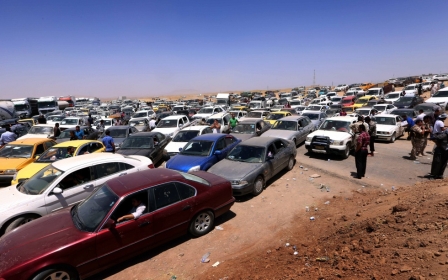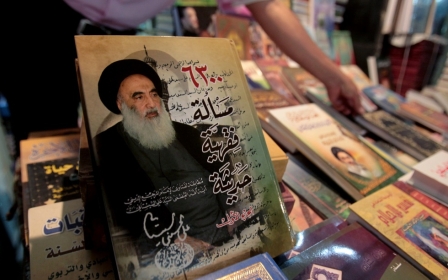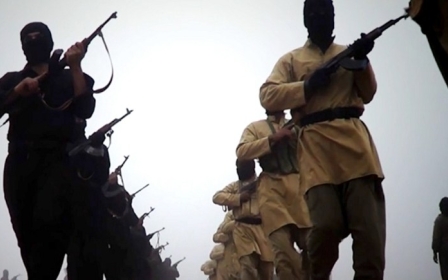Politics, not religion to blame for Iraq’s ills

Events are unfolding at an alarming pace in Iraq following the armed offensive led by the Islamic State in Iraq and the Levant (ISIL) less than a fortnight ago, with concerns about Iraqi unity deepening and a political solution appearing a far more complex prospect.
It is obvious that the current anarchy is a consequence of a failed political system, a lack of political will and an absence of a prudent unifying leadership. The question is: will Iraq recover from this as one country or is this the beginnings of a disintegration?
A close reading of Iraq’s political past, specifically since its formation under the British administration in 1921, is needed to fully understand the underlying issues triggering much of the unrest and instability over the past few decades.
However, it is clear that anger and tensions among the Sunni population have grown quickly in the first quarter of 2014. This was due to perceptions that the government-led military operations inside Anbar province aimed at excluding the Sunni population from participating in March general elections.
This underlines how the failed political system has seen the Sunnis back the ISIL-led insurgency.
Regional players
So, who in the region benefits form a divided Iraq? The government of Iraqi Kurdistan, in a swift response, seized control over the long-disputed territories of the oil-rich province of Kirkuk a few days after the outbreak of violence - the most important gain thus far in the conflict.
Erbil likely has no intention of letting the city go, since ownership of it reinforces the Kurdish economy and brings closer the realization of a separate independent state – even though this poses a direct and serious threat to the governments in Turkey and Iran.
The outlook is less certain for Iran. While Tehran's influence in the region will also be threatened if Iraq evolves into a federal country, with one part going to the Sunnis and the other to the Kurds, the current situation also offers Iran an excellent opportunity to agree a nuclear deal with the West that could end crippling sanctions.
US and foreign interference in Iraqi affairs has failed to create a natural transfer to democracy. The US made a grave error by launching an illegal war against Iraq, and an even bigger one by withdrawing prematurely, leaving the country in turmoil with a fragile government despite the billions spent on rebuilding.
Many observers want to paint the current situation in Iraq as driven by a clash of ideologies between Sunnis and Shiites. However, religious differences and disputes go back hundreds of years and yet had never reached a stage of civil war.
What is true is that the majority of Iraqi people from both sides, as diverse as they may seem, disapprove of the government’s performance and the self-centred nature of politicians and parliamentarians.
The past 10 years, since the US-led invasion on Iraq in 2003, saw bitter rivalry and growing hostility between political adversaries in Iraq, triggering conflict and tensions among the supporters of the major Sunni, Shiite and Kurdish political parties, increasing the resentment among the population.
Observers and analysts of the situation agree, to a certain extent, that the major political blocs in Iraq are fighting a proxy war, while maintaining their interests, without a sight of a ceasefire; especially with Saudi Arabia continuing to fund extremist groups in the region, and Iran continuing to back a puppet government in Baghdad with logistics and intelligence.
Furthermore, the current government in Iraq can no longer justify a new term in power in light of the scandalous performance of its army, the exclusion of the Sunni population from political participation and the weak response to foreign insurgency despite early warnings of its advancement to Iraq.
The puzzling thing though, is how the US has responded differently to the ISIL issue from when it first emerged in Syria.
Despite ISIL declaring their agenda of establishing a caliphate, the Obama administration stepped back from any intervention in Syria to stop the group's rise. One rational explanation for this could be that the US did not see ISIL as a threat to their interests, and probably didn’t want to further aggravate the relations with Russia by interfering in Syria.
However, now given the rapid progress of ISIL into Iraqi territory and the swift strategic achievements - particularly the capturing of one of Iraq’s biggest oil refineries -the US can hardly ignore the provocation.
The deeply rooted theological and political divisions between the Sunnis and Shiites in Iraq and the determination by ISIL to install a caliphate suggests that Iraq, and the Middle East at large will never be the same again after the recent developments.
And in a disintegrated Iraq, the current sectarian divisions could simply evolve into deeper internal conflicts among Sunnis and Shiites given that both are already divided into various political parties and sects.
-Halah Al-janabi was born in Baghdad, Iraq in 1971 to an Iraqi father and English mother. Halah has developed a career in project management and International humanitarian aid and development for the MENA and the Indian subcontinent regions, and is a professional translator who over a period of 15 years has provided translation services for international organisations and agencies including several USAID programmes in Iraq.
The views expressed in this article belong to the author and do not necessarily reflect the editorial policy of Middle East Eye.
Photo credit: Peace Brigade organize a parade in Baghdad, Iraq on 21 June, 2014. The Peace Brigade is established by leader of the Sadrist movement Muqtada al-Sadr to protect sanctuaries in Iraq and Shiite prayer rooms.(AA)
New MEE newsletter: Jerusalem Dispatch
Sign up to get the latest insights and analysis on Israel-Palestine, alongside Turkey Unpacked and other MEE newsletters
Middle East Eye delivers independent and unrivalled coverage and analysis of the Middle East, North Africa and beyond. To learn more about republishing this content and the associated fees, please fill out this form. More about MEE can be found here.





